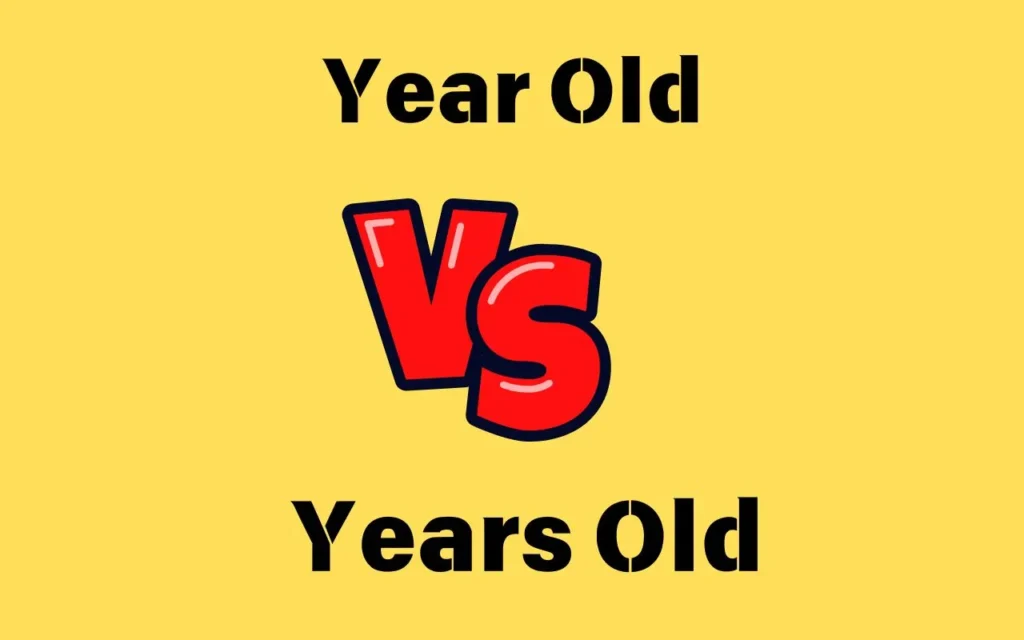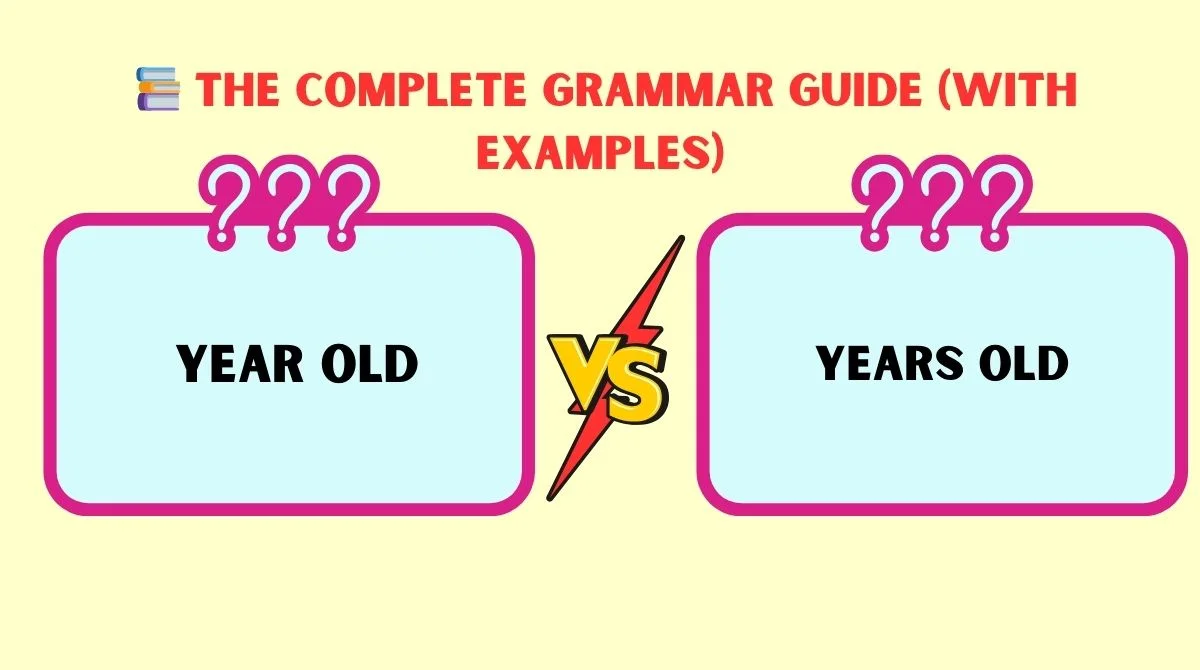Last updated on September 26th, 2025 at 01:39 pm
English learners and even native speakers often stumble over “year old” vs “years old.” Should you write a five-year-old boy or a five years old boy? The truth is, the difference is simple once you understand a few grammar rules.
👉 Quick Answer :
- Use year-old with a hyphen when age modifies a noun before it: a three-year-old child.
- Use years old (no hyphen) when the age follows a verb: The child is three years old.
- Avoid “year old” without a hyphen unless “year” and “old” are separate words in the sentence.
This guide will take you through clear examples, grammar rules, real-world usage, style-guide notes, and common mistakes so you’ll never second-guess age expressions again.
Quick-Reference Table: Year Old vs Years Old

Here’s a simple chart to clear things up at a glance:
| Form | When to Use | Example Sentence |
|---|---|---|
| year-old | When age modifies a noun (attributive adjective) | She adopted a two-year-old puppy. |
| years old | When age follows a verb or stands alone | The puppy is two years old. |
| year old (no hyphen) | Rare, only when “year” and “old” are grammatically separate | He is a year and a half old. |
| year-olds (plural) | When referring to people/things collectively by age | The daycare has three four-year-olds. |
| X- to Y-year-old | Age range modifying a noun | A 5- to 7-year-old program. |
The Core Grammar Rules Behind “Year Old” vs “Years Old”
Attributive vs Predicative Position
The main distinction comes down to where the age phrase appears in the sentence.
- Attributive (before a noun):
- Hyphen required: a 10-year-old car.
- Without the hyphen, readers might misinterpret it as 10 year old car (awkward and confusing).
- Predicative (after a verb):
- No hyphen: The car is 10 years old.
- Notice the plural “years” because you’re counting the number of years.
📌 Tip: If the phrase comes before the noun, use year-old (hyphenated, singular “year”). If it comes after the noun, use years old (no hyphen, plural “years”).
Compound Adjective Mechanics
The hyphen in “year-old” shows that the words belong together as one adjective. Without it, the sentence can be misleading.
- ✅ She bought a 15-year-old violin.
- ❌ She bought a 15 year old violin. (could be misread as “15 year” + “old violin”)
Hyphens prevent confusion and keep writing precise.
Plural Forms and Hyphen Placement
One of the trickiest parts is pluralization. Here’s the golden rule:
- Pluralize the whole compound, not the “year.”
- ✅ The playground is full of six-year-olds.
- ❌ The playground is full of six-years-old.
📌 Also note: When listing multiple ages, keep the hyphen structure intact.
- The five-year-old and six-year-old siblings are inseparable.
- The five- and six-year-olds were playing together.
Numbers, Numerals, and Style-Guide Nuances
Numerals vs Words
In most modern writing:
- Use numerals for ages: 5 years old, a 5-year-old child.
- Spell out at the beginning of a sentence: Five-year-olds love cartoons.
Example:
- The boy is 10 years old. (numeral)
- Ten-year-olds are starting middle school. (spelled out at start of sentence)
Style-Guide Differences
Different style guides tweak the rules slightly:
- AP Stylebook: Always use numerals for ages. Hyphenate “year-old” when used as a compound adjective.
- Chicago Manual of Style (CMOS): Similar approach. Advises clarity with hyphens in compound adjectives.
- MLA: Follows Chicago conventions in most cases.
- Oxford Style: Stresses consistent use of hyphens in age modifiers.
📌 Key takeaway: No matter which style guide you follow, the hyphen in attributive use is almost always recommended.
Hyphenation with Ranges
When you’re talking about age ranges, keep the structure clean:
- ✅ a 5- to 7-year-old child
- ✅ 5–7-year-olds need special supervision
- ❌ a 5–7 years old child (incorrect)
Notice that “year-old” stays singular, even in ranges.
Real-World Examples of “Year Old” vs “Years Old”
Here are examples you can rely on in everyday writing:
- My daughter is eight years old. (predicative)
- She is an eight-year-old girl. (attributive)
- The teacher grouped the six-year-olds together. (plural)
- He is a year and a half old. (separate words)
- We bought a 20-year-old bottle of wine. (compound adjective)
- The car is nearly 15 years old but still runs smoothly. (predicative)
- The eight- and nine-year-olds competed in the spelling bee. (shared structure)
Every example follows the hyphen and plural rules you saw earlier.
“Year Old” Without a Hyphen — When Is It Correct?
Many people assume “year old” without a hyphen is always wrong, but that’s not true. It works in specific cases where “year” and “old” don’t form a single modifier.
Examples:
- He is a year and two months old.
- That law is one year old.
- This tree is almost a hundred years old.
Here, “year” and “old” are separate words, not a compound adjective. That’s why no hyphen is needed.
Examples from Reliable Sources
Here are examples adapted from dictionaries and style references (Merriam-Webster, AP Style, Oxford):
- Merriam-Webster: a 30-year-old tradition
- AP Style: The 5-year-old boy smiled for the photo.
- Chicago Manual of Style: She is 45 years old.
- Oxford: The ten-year-old child recited a poem.
📌 Using examples from trusted sources ensures your writing aligns with professional standards.
Historical Usage and Trends
Language evolves, and hyphenation trends reflect that. According to Google Ngram Viewer:
- Before 1950, writers often omitted the hyphen (5 year old child).
- From the 1960s onward, hyphenated forms (5-year-old child) became dominant, especially in formal writing.
- Today, style guides consistently favor the hyphen in attributive uses.
👉 Takeaway: The hyphen is not a trend—it’s now the established norm.
Special Contexts and Tricky Cases
Legal and Formal Documents
Contracts, medical reports, and legal records often state ages explicitly:
- Patient is 12 years old.
- Defendant, a 17-year-old male, was present at the hearing.
Formal writing prioritizes clarity, so rules are strictly followed.
Marketing and Product Copy
Marketers rely on hyphens to avoid ambiguity:
- a 2-year warranty (clear, professional)
- Without the hyphen (2 year warranty), it risks misreading.
Conversational English and Social Media
On Twitter or casual chats, people sometimes skip hyphens:
- My kid is 5 year old today lol.
It’s common in informal speech, but in professional writing or published content, stick to standard grammar.
Non-Native Speakers & ESL Learners
Common mistakes include:
- Writing 5 years-old child (incorrect plural).
- Omitting the hyphen: a 10 year old house.
💡 Quick Practice Tip: If the phrase comes before the noun, hyphenate. If it comes after, don’t.
Quick Style Checklist
Before publishing, check these rules:
- ✅ Hyphenate year-old before a noun.
- ✅ Use years old after a verb.
- ✅ Use numerals for ages (unless starting a sentence).
- ✅ Pluralize correctly: five-year-olds.
- ✅ For ranges, write: 5- to 7-year-olds.
- ❌ Don’t write 5 years-old child.
Cheatsheet: One-Line Examples
- She is 12 years old.
- a 12-year-old girl
- Two-year-olds are curious.
- The book is one year old.
- a 5- to 7-year-old group
- The eight-year-old and nine-year-old siblings
- He is a year and a half old.
- They care for 15-year-olds at the camp.
FAQ: Year Old vs Years Old
When should I use “year-old” with a hyphen?
Use “year-old” before a noun to show age as a compound adjective: a 7-year-old boy.
Is “3 years old” or “3-year-old” correct?
Both are correct depending on placement: She is 3 years old vs a 3-year-old girl.
How do you pluralize age modifiers?
Add “s” to the whole phrase, not “year”: six-year-olds.
Which style guide should I follow?
Most guides (AP, Chicago, Oxford) agree: numerals for ages and hyphenate compound modifiers.
How do I write age ranges?
Write 5- to 7-year-old children or 5–7-year-olds. Don’t write 5–7 years old children.
Is “year old” ever correct as two words?
Yes, when “year” and “old” stand separately: a year and two months old.
Quick Quiz: Test Yourself
Fill in the blanks with the correct form:
- The boy is ___ (five years old / five-year-old).
- She bought a ___ (12 years old / 12-year-old) bicycle.
- The playground has many ___ (three-year-olds / three-years-old).
- He is a year and a half ___.
- They are raising funds for ___ (10 to 12 years old / 10- to 12-year-olds).
Answers:
- five years old
- 12-year-old
- three-year-olds
- old
- 10- to 12-year-olds
Conclusion
Mastering year old vs years old is about placement and hyphenation.
- Year-old = before the noun, hyphenated.
- Years old = after the verb, no hyphen.
- Year old (separate words) = only in rare contexts like a year and a half old.
When in doubt, ask: Is the age describing a noun directly before it? If yes, hyphenate. If not, leave it open.
👉 Bookmark this guide, use the cheatsheet, and you’ll never stumble on this rule again.
